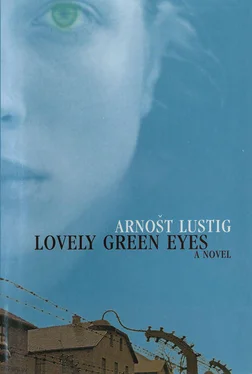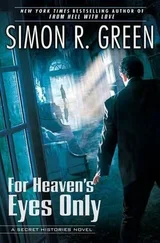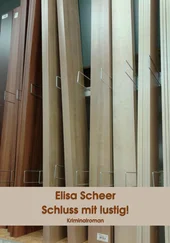It seemed laughable to Adler, but it was the first thing he told us that day.
“It’s an unfinished story,” he said.
Fortunately we were at an age when you didn’t feel sad for 24 hours a day, even though it was just as impossible to feel happy for 24 hours a day. We endeavoured to raise our spirits with free meals in one of Prague’s soup kitchens, where the three of us were frequent visitors. Once Adler said that he wouldn’t like to be a widow dining there, being reminded by the blobs of fat floating on the soup of the eyes of her dead husband. Skinny did not find this remark funny. Where did Adler get his ideas from?
“Who did they kill in your family?” he asked her.
“All of them,” Skinny said.
“Same here,” Adler said.
They fell silent. It was the same for practically everybody. Adler had found it rather ridiculous when his concierge asked him how the world could have permitted it. Now it seemed just as ridiculous to Skinny. I was glad no-one asked me the same question. I had been in an orphanage even before the war. I imagined my grandmother Olga’s fate without having to ask. People over 35 had a slim chance, those over 60 none whatever.
“What will you inherit?” Adler asked her.
She didn’t answer him.
Because Skinny had so often lost all she had, after the war she clung to everything she could get hold of. She had three pairs of boots. She called them “my dear little boots,” even though she just looked at them and wore other shoes. Or she would play with a new skirt (or rather an old-new one she’d been given by Mrs Jäger of the Jewish Community’s social welfare department) and address it by name, as “my dear little red skirt”. That one kept its name: the Red One. She also had a green one, a check one and a striped one which was pleated. She had to feel things, to touch them. She would reassure herself during the night — getting out of bed — that they were hers. She reconciled herself from the outset to the fact that she could lose her things and she was surprised if she kept anything. To have and not to have, to receive and to lose: inversely proportional dimensions. Loving her new things as she did, she was unaware that some of it looked like stuff from a second-hand clothes shop. But while her wardrobe became more and more colourful, she felt naked and impoverished — probably because she wanted to be ready in case misfortune once more befell her.
She spoke about her family.
“My father saw Germany as a locomotive at full speed. Us he saw as tied to the rails. The train was rushing towards us. Nothing could stop it.”
She did not say then that her father had thrown himself at the high-voltage fence at Auschwitz-Birkenau. Nor did she say anything about Rottenführer Erich Schratz. Schratz had beaten her father’s face, his head, his private parts for six days running. The seventh day was a Sunday and the Rottenführer was not on duty. But he had given instructions to the block leader. This man did not beat her father so hard, but he could not ignore his orders. That was the day her father took his life.
Her mother had met her fate on a bridge, just a few steps from her native land. And Ramon was dead too. He was almost 14. Would he have gone on with school? Her father had believed that a trade would be preferable.
I could guess what she was thinking of, because she added: “Good and evil. Perhaps Hitler didn’t think he was a devil.”
I shall not forget the way Adler — with whom we became a threesome with all the advantages and disadvantages of such an arrangement — inspected Skinny one day. It was in Wenceslas Square in front of the Hotel Europa, where we used to meet. For an instant his eyes rested on the centre of her skirt, then he raised them. She was standing before him in a thin blouse, a rather long skirt, high boots as for mountain walking, and floral-patterned socks — a very pretty girl. He appreciated her reticence. Adler was apt to seek in others what he was afraid of in himself. Probably the thing that bound us together was that we didn’t have a lot to share, since none of us had very much — a subsidy from the Repatriation Office, a few clothes supplied by the social welfare department, and in Skinny’s case, a green US Army blanket from which she had fashioned a single-breasted winter coat with green buttons made by an acquaintance of her mother’s. It matched her eyes. We spoke about her, Adler and I. I didn’t want to wind up like Adler — he loved her one day and spoke ill of her the next.
I watched her closely when she was unaware of it. There was something of the expression of a frightened deer, as well as its charm, in her green eyes with their gingery lashes and paler eyebrows. Her face seemed to me every bit as pretty as Greta Garbo’s, whom the three of us had seen in Ninotchka, La Dame aux Camâias and Queen Christina . She had a kind of dignity, that of the humiliated, in her face, her features, her head and her movements, in the way she behaved and expressed herself.
After all she’d been through she still believed in that empty place between her crotch and her abdomen, which no-one would fill or dishonour or violate unless she invited him in. It was not, of course, the only empty place in her. I tried to imagine her belly as a hidden secret box. And she still believed in her father’s love for her mother when she was conceived.
She viewed the world as a huge camp that contained a variety of divisions and reservations. If she was lucky she might stay in one of them for a long time, perhaps all her life, in transit. But to ever escape, to ever be truly free, seemed out of the question to her.
I met Skinny every day because I came to feel as though every hour, minute or second I was not with her was lost time. I talked to her of everything possible. I didn’t search for details, even though I nearly knew. It was several weeks before I saw her Feldhure tattoo. She didn’t show me her belly for the reasons I would have preferred. She wanted me to know where I stood with her. And perhaps also where she stood with me, or with herself.
On Petrin Hill I spoke of love for the first time in my life. I was sending a message to Skinny, Hanka Kaudersovâ, that the waters were receding — as with Noah’s ark. I loved her blindly — if love is blind. This I did not say, I only thought it. I was starting out on a new life, like her, willing to squeeze a whole ocean out of every puddle. I loved her with that invisible urge which has to overcome the boundary between the courage and fear to say that we are in love, because the fact that it’s not a lie is not nearly enough.
I loved her with that wonderful and vertiginous balancing act between what we have and what we dream of. The moment when no disease is infectious, no sin unforgivable, no obstacle insurmountable. And, ultimately, no past forbidding and no bad experience decisive. It was not only uncertain, tormenting and wonderful at the same time; there was also an element of ambition, a wish to climb a steep hill regardless of what we might see from the top.
In her mind she returned to Poland. The worst day had not been the first day at No. 232 Ost, but the second when she told herself, “Oh Lord, now It’s starting all over again.”
Twelve: Gustav Habenicht, Sepp Bartels, Rolf Baltruss, Fritz Puscha, Heinrich Rinsfeld, Otto Scholtz, Heine Baumgarten, Friedrich Heindl, Wilhelm Kube, Johann Kurfürst, Hans Bergel, Rudolf Weinmann.
The Oberführer appeared at the end of the corridor in fur-lined boots and a fur coat that reached to his ankles. The girls fell silent. He looked at them as if they were not naked, or else it made no difference to him. He regarded them as inferior beings.
A huge gale had uprooted the remaining trees by the river. It had swept through at 90 miles an hour. The torn-up trees were lying in the direction of the wind, their roots uncovered and their branches snapped. The Madam had ordered the girls to drag the branches into the yard. The guard who accompanied them had lost his faith in army meteorologists.
Читать дальше


![Корнелл Вулрич - Eyes That Watch You [= The Case of the Talking Eyes]](/books/32103/kornell-vulrich-eyes-that-watch-you-the-case-of-thumb.webp)









